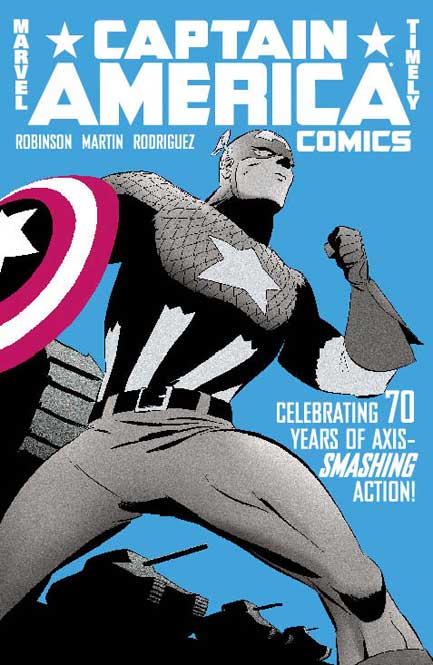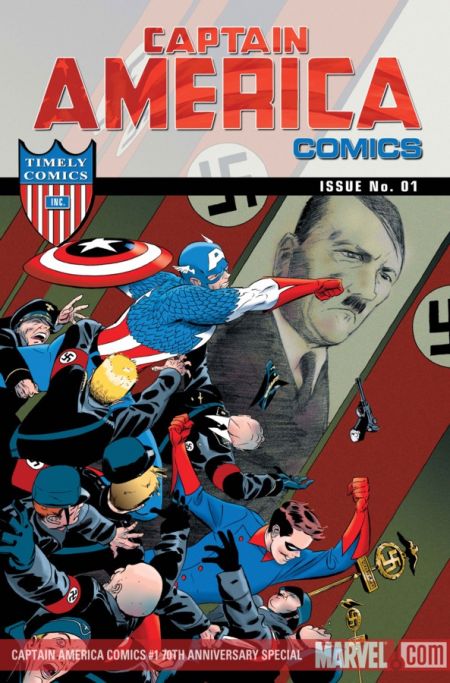Comics /
Comic Reviews /
Marvel Comics
Captain America Comics 70th Anniversary Special #1
By Andy Frisk
April 1, 2009 - 22:26
In this two story volume we get a modern tale narrated by Bucky, Cap’s partner which takes place in 1942 and a reprint of a Captain America tale from 1941.
In the first tale, Bucky relates a story to us about the man who is Captain America, Steve Rodgers, just before he volunteers for the super-soldier program that births Captain America. Right after being labeled a 4-F (unfit to serve physically in the military), Rodgers is literally run into by a Federal Agent who is being pursued by Nazi agents in an attempt to steal the very secret of the super-soldier serum shortly to be administered to Rodgers. Rodgers displays courage and physical steadfastness beyond his capabilities in eluding his would be Nazi murderers and returning the formula to the military. His actions prove, at least in Bucky’s mind, that it isn’t Cap’s strength or fighting ability that makes him great but rather his character, i.e. the kind of man that Steve Rodgers is.
Overall, it’s an entertaining tale with a sound message for youngsters that it’s who you are and not what you take (super-soldier serums, read steroids), or what you wear (like a star spangled costume, read designer clothes), or how physically strong you are that makes you great. Its incredibly ironic then to discover in the reprinted “Captain America: Death Loads the Bases!” from CAPTAIN AMERICA COMICS # 7, October 1941 that Steve Rodgers/Captain America was perhaps the first pitcher in Major League Baseball who was “juiced!”
Ok, so with tongue firmly in cheek here, during the 1941 tale, Steve Rodgers, as Captain America pitches an MLB game with Bucky as his catcher while, obviously, juiced up by the super-soldier serum. Forget Roger Clemens, can you imagine the heat that Steve Rodgers could have brought?! I mean, great fastball pitchers today get the ball moving up to speeds that register in the low 100 mph range. Now, I’m just going to take a wild guess here, but Cap can run at about 30 mph or so right? That puts him a little faster than Usain Bolt, but we have to assume Cap has greater stamina and hold this speed up for a while longer. So, if he can pitch in say the 130 mph to 140 mph range and as he loses velocity as the game progress due to fatigue he still would be hitting the 110 mph to 120 mph range in the late innings! After WWII Cap should have taken a few years off and pitched in the majors. He would have made millions! He’d definitely have to get back to be being Captain America full time though before the Steroid Era. He wouldn’t want an asterisk by his name.
Ok, ok, I’ll quit being silly. Baseball season opens in a matter of days and I’m all pumped up for the new season like I am every year. Someone at Marvel must be too, since at first I couldn’t figure out any reason why this baseball themed Captain America tale was reprinted here. It’s a great little piece of 1940’s Americana with its slang, (“Take dat, ya fresh kid!” and “Quick Charlie! Bop ‘im!” and “Oh well. I’ll go for the whole hog.”), its interest in baseball (now arguably supplanted as America’s Pastime by NFL Games or, maybe, blogging on Facebook), and its naïveté. There are no complex storylines like “Civil War” or “Dark Reign” hanging overhead and none of the moral ambiguity of the “doing the wrong thing for the right reason” actions of Tony Stark or the perceived heroism of Norman Osborne who really is doing a wrong thing in the guise of doing the right thing and being praised for it. There’s good and bad and obviously The Toad is the bad guy and Cap and Bucky are the good guys.
 |
There is an interesting contrast though between the first new tale and the second reprinted tale that can shed some light on maybe why they’re published together. In the first tale the story goes to extreme lengths to show that the super-soldier serum isn’t what makes Captain America great and that it’s the kind of man Steve Rodgers is rather that makes him great. In the old tale it is obviously the super-soldier serum that makes him great. Just look at my purposefully comic take on Cap’s “juiced” baseball skills. This reaction is totally based on Cap’s physical strength and just how appealing that must have been to the youths reading this 1941 tale. Yeah, Cap’s still the good guy in the 1941 tale and wants to stop the bad guy, but the entire tale is built around the climax of Cap’s playing super baseball powered by his serum. The old Cap tale is all about busting up the bad guys, baseball bad guys in this case, which by the way has nothing to do at all with stopping the Axis Powers. Perhaps this is on purpose as there was a real world war going on at the time which many felt there might not be an end to anytime soon so perhaps, as well, it was a good idea to place Cap in a ball game to inspire kids to want to be a “super” soldier too when their time came to serve. The new Cap tale is deeper, with a more metaphoric and morally significant theme: greatness of character comes from greatness of conviction. Our generation has no world war so it must be inspired to right action in deeper ways. These ways are not just tied to military service as it was in the 1940’s but to the service of ones ethical convictions, compassion for fellow men and women, and the confidence to overcome the complex challenges of today’s world like the troubles with the world economy and the threat of terror and how it can change the moral convictions of a society in ways that are not good for the society in total, much like the Steve Rodgers did in the first tale of this volume. He overcame his limitations.
Captain America, as a metaphor for strength of conviction, be it moral, ethical or spiritual, is still a vital character today and excellent vehicle for conveying those ideals. Steve Rodgers may be dead but his spirit and example of heroism still lives on. While his tales have gone from black and white, good vs.evil tales to complex battles between ideals and ethical stances, the premise remains the same. Cap tries to do the right thing and inspire others to as well. Happy 70th Anniversary Steve. We miss ya.
Rating: 9 /10
Last Updated: January 17, 2025 - 08:20

